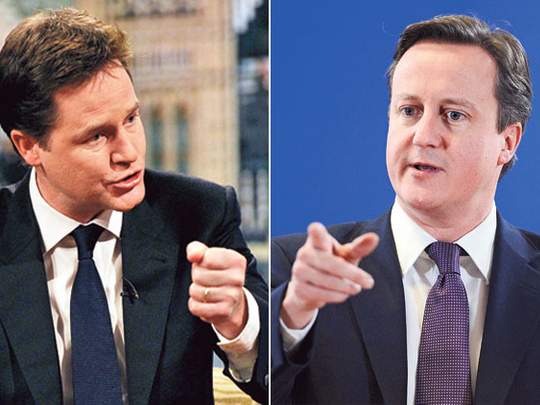
For more than 20 years, the phrase “house of cards” has meant something special at Westminster: Michael Dobbs’s novel about intrigue in the post-Thatcher Tory party, dramatised on television, produced catch-phrases and villains galore. A key part of the plot, older readers might remember, hinged on the Conservative prime minister’s refusal to carry out a serious cabinet reshuffle.
Yet, for the current coalition government, “house of cards” seems particularly appropriate and the mood of internal intrigue is almost as sulphurous. Try to pull away the wrong card, or do it clumsily, and the whole edifice will fall.
Shift George Osborne and the remaining shreds of economic confidence fall away — it’s as good as an admission of complete failure so far. Even if he dared confront his friend, David Cameron just can’t. Similarly, Nick Clegg can’t sanction the demotion of Vince Cable without radically destabilising his own position as party leader just ahead of the Liberal Democrat conference. Cable may irritate Clegg, and indeed Osborne, but now that the government is moving ahead with his “big idea” of a national investment bank, it would look daft to oust him.
Michael Gove, the Education Secretary, despite the fury over GCSE grades, can’t be demoted because he has become a hero of a section of the Tory right and is only halfway through his plans for English schools. Shift the Health Secretary, Andrew Lansley, and you admit that his NHS plans were a terrible botch; shift the Transport Secretary, Justine Greening, and that’s as good as a green light for Heathrow expansion and a major U-turn. Any of these moves would trigger a wider slip of the card castle. They would make Cameron’s position look weaker and the prime minister must know the piranhas are beginning to swirl.
So while Cameron’s advisers Ed Llewellyn and Kate Fall are hard at work scribbling lists of more junior posts for this week’s much-trailed reshuffle of ministerial jobs, we already know that nothing like a game-changer is going to happen. Both Cameron and Clegg currently look too weak to surprise the political world.
It matters, a bit, if Ken Clarke, the Justice Secretary, is finally shuffled down or out. It would certainly perk up the government to find some of the under-promoted women such as Elizabeth Truss and Margot James finally reaching big jobs, particularly if other women are to be casualties. But none of it begins to touch the depth of the problem which, if things continue this way, will finish both leaders for good.
One can, if one chooses to be fastidiously neutral, feel a certain sympathy for the economic ministers. The economy is paralysed, shivering to death. But rather like the horrible summer weather, an icy jet stream of dire economic news has been hovering over Britain.
The trouble is that almost all the thinking is really Labour thinking. The coalition was told its cuts were too deep and too quick, and has found that it cannot make the cuts in welfare and current spending it thought it could, and has had to rely more on tax rises and cutting Labour infrastructure plans. Now, after three successive quarters of negative growth, with the economy flat on its back, ministers are starting to “reverse ferret”.
Infrastructure is back in fashion, a special national bank to push money into cash-starved businesses is going to be set up after all, the dire shortage of houses will be addressed, and planning will be made faster. What took them so long?
Now, the obvious question is whether it will be done with the gusto and on the scale the government’s critics have suggested. Cameron and Osborne are going to have to fend off increasingly furious protests from the Tory right, once those MPs realise that, far from deeper cuts and the slashing of employment protection, they are heading cautiously the other way.
Reading Cameron, and listening to Osborne, over last week, it seemed they had decided to use the rhetoric of the Olympics as cover for a shift of emphasis, in a bluff “all in it together, look what Britain can do” way.
My advice would be to be very careful about that. The message of the gold-winning Olympians and Paralympians is that public investment, properly directed, works pretty well. I’m not sure that is what the Tory conference wants to hear.
As for Clegg, if anyone has ever had a quicker comeuppance for meaningless pre-conference verbiage than his suggestion the rich should pay more, I can’t remember it. Sure, the wealthy should pay more. But if Clegg believes that, what is he doing in this coalition? If he really meant it, he would have to resign and call for an election.
No, I don’t see that happening either. Words without purpose. I really hope that this stimulus does happen and that it is big enough to work. But for now, all I see is a house of cards and a gusting autumn wind.








